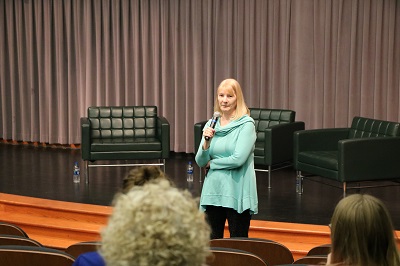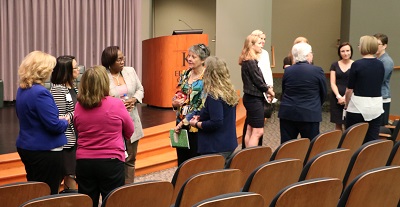Getting Ahead: Women in Professional Leadership

According to the U.S. Department of Labor, there are 74.6 million women in the civilian labor force, accounting for almost 47 percent of U.S. workers. Women are also more likely than men to have earned a bachelor’s degree by age 29. However, the number women in the workforce and pursuing a college education hasn’t led to an increase in female managers or corporate leadership. According to a 2018 study by Lean In and McKinsey & Company, only about one in 15 C-suite leaders (senior staff members such as a CEO, CFO or COO) is female. Only one in 25 is a woman of color.
This gap extends to the world of higher education. According to a 2017 report by the American Council on Education (ACE), women hold only 30 percent of presidencies across all higher education institutions, despite the fact that women university presidents are more likely to have a Ph.D. or education doctorate than their male peers.

During April’s ACE Women’s Network event at the KU Edwards Campus, female higher education leaders from across eastern Kansas discussed their experiences, and shared strategies to overcome this disparity. Here are a few highlights of the event’s conversations about how women can advance their careers, in higher education and beyond.
Seek out mentors
Getting help from someone in your field who shares your professional interests or experiences is a great way to grow your professional network, learn about job opportunities and push yourself into new areas of expertise.
Cindy Pemberton, deputy provost at the University of Missouri - Kansas City, said having multiple mentors, with backgrounds that differed from her own, helped her diversify her knowledge and perspectives.
“Sometimes you can get caught up in your own space and you need those outside perspectives,” Pemberton said during a panel at the ACE event. “Making sure that you have those, and having a group of mentors who are in different places in their careers, is really important as well.”
Betsy Draper, associate vice provost for information technology services at Kansas State University, says she’s had direct experience with this in her own mentor relationships.
“I think back in particular to one instance where I was early in my career and I wanted to strengthen my technology credibility. I was looking at a volunteer opportunity outside the university, and my mentor suggested that instead of participating in the technology aspect of this opportunity, I participate in a social welfare project,” Draper said. “I thought ‘I have no experience in this area,’ and this mentor told me ‘that’s why you need to do it.’ And it was great advice. I did it, and it was a life-changing experience for me.”
Pemberton says sometimes it’s worth seeking out specific people who you believe can help you achieve a professional goal.

“Sometimes, to be real honest, depending on what I was doing and where my career was, I sought out certain people because I thought that their expertise would help me understand where I was a little better,” Pemberton said. “I tried to share with them how I thought the relationship would best benefit me, because I didn’t want to build that relationship under any false expectations.”
Create boundaries, but be flexible
During the ACE event panel discussion, DeAngela Burns-Wallace, KU’s vice provost for undergraduate studies, said she believes less in work-life balance than in setting healthy boundaries and creating a support system to help keep from getting overwhelmed.
“People say it takes a village to raise a child, but I think it just takes a village, period. I don’t like the conversation of work life balance, because for me, one of them is always out of balance,” Burns-Wallace said. “Some days it’s work and it’s crazy, and some days it’s my child and it’s crazy, but being able to use my village, whether it’s my work village or my home village, knowing I have that community is a huge piece. When I’m out of balance, I know I don’t have to figure out how to do every piece of it.”
Pemberton advises flexibility, and being clear about your needs, since personal and professional challenges can always create the need to rearrange priorities.
“Each of us have different challenges in our personal life, and those will change as your life experience changes,” she said. “Be sure you have conversations with the folks you work with to understand what the culture is (in your workplace), and where their values lie. There’s nothing worse than being in your work environment, and you’re not really there because you’re stressed.”
Build a reliable support network
To that end, building connections with trusted colleagues who know your strengths — as well as areas you’d like to grow in — can be a valuable professional asset, according to Burns-Wallace.
“What I would say about my journey was that many times opportunities were presented to me that I might not have been aware of, but I had the networking and support system to point them out to me and help me take advantage of them,” Burns-Wallace said.
Data reflects that women who are successful leaders often are supported by other female colleagues. A study in the journal “Proceedings of the National Academy of Sciences of the United States of America” found that more than 75 percent of women in leadership positions have mostly female inner circle, or have strong ties to other women in their network.
Draper says she partly sees her role as one of advocacy for other women in her field. “I take every opportunity I can to lift up the very good and quality work that my female colleagues do,” Draper said. “In part, it’s because they are vastly underrepresented in all areas where I work.”
The KU Edwards Campus offers many options to further your career and open the doors to new leadership opportunities. Learn more by checking out our undergraduate and graduate leadership-oriented degrees and certificates. KUEC also offers professional and continuing education opportunities, including free business communication webinars and a professional leadership certificate.
Top Photo: KU vice provost for undergraduate studies DeAngela Burns-Wallace, UMKC deputy provost Cindy Pemberton and KUEC director of community engagement & business development Carolyn McKnight discuss the lessons learned from their careers in higher education leadership at April's American Council on Education Women's Network event at the KU Edwards Campus. Learn more about the ACE Women's Network on the webpage.





